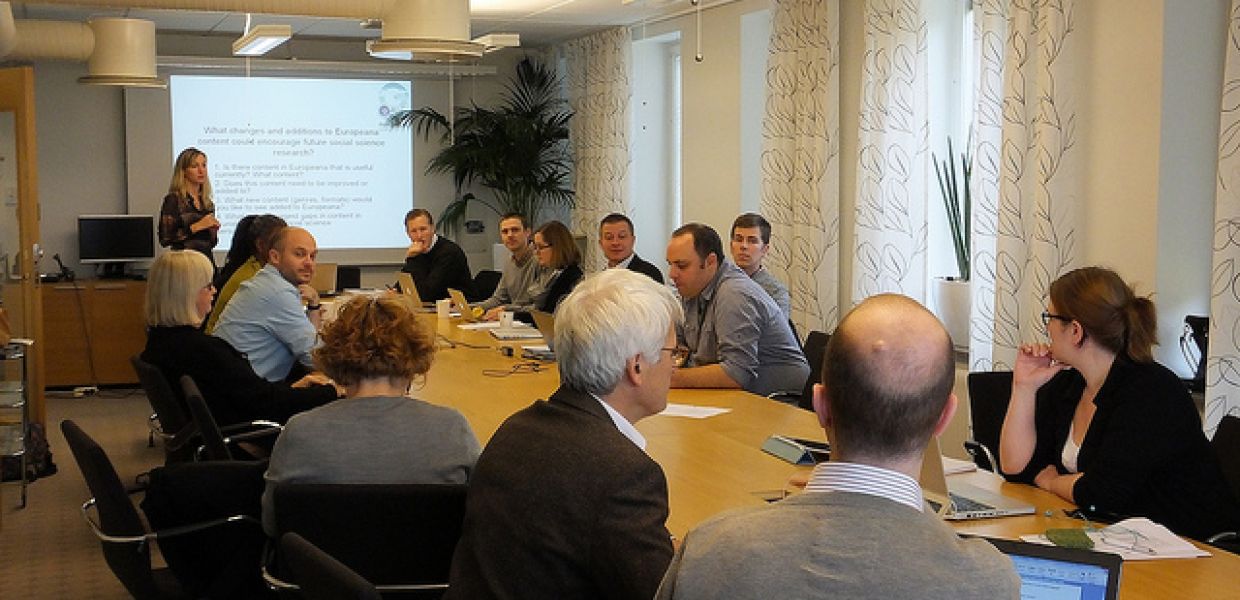Imagining Europeana Cloud for Researchers in the Social Sciences

Written by Susan Reilly of LIBER, a Europeana Cloud project partner.
One of the roles of the Europeana Cloud project is to identify and assess the needs of researchers from the humanities and social sciences domains in relation to the cloud, and to ensure the wider research community has a chance to engage with the construction of the cloud. By exploring how researchers could potentially interact with and use Europeana content, we will be able to build a solid content strategy for the aggregation of research content. We will also ensure that the technical architecture of Europeana Cloud and related tools are developed to meet these needs. This work to engage the research community, increase their awareness of Europeana, and gather input regarding the usefulness of the content and requirements for tools is being done through four expert forums, the most recent of which was hosted by the University of Gothenburg on 24-25th October, 2013.  Discussing the cloud at a workshop in Sweden. Photograph by Norman Rodger. The meeting was attended by group of Europeana Cloud partners and researchers from across Europe. The participants' research interests ranged from gender studies, to economics, to information interaction. Together they discussed and interacted with the Europeana portal and scoped tools for Europeana Cloud. The forum kicked off with what is fast becoming a staple feature of our expert forums, the Europeana treasure hunt. Designed as a quick way of familiarising participants with Europeana and as an ice-breaker, the reluctance of participants to cease in their treasure hunt efforts showed that social scientists are no less competitive than their humanities counter parts. With this basic introduction to Europeana and its content complete, the forum changed focus to explore what tools are used by social scientists and what tools they might use to exploit Europeana content. The experts listed a vast array of tools for both quantitative and qualitative research. They also listed a large number of tools for collaboration. The experts felt they primarily needed visualisation, analysis, and mining tools to exploit Europeana content. All of the experts felt that tools for evaluation of the content was of high importance. The discussion of tools to evaluate content led nicely into the second breakout session of the expert forum, which took place the following morning and focused on content. This was a slightly more difficult discussion. The experts felt that Europeana did not necessarily need more content but rather more quality content and mechanisms which could be used to evaluate the content coverage and gaps, depth, quality, origin and relevance. One interesting suggestion was that Europeana should start promoting content to the researcher by formulating research questions that could be explored through the Europeana corpus and encouraging researchers to conduct this research. Overall, the key message from the expert forum was that Europeana Cloud does not need to answer all research questions or have comprehensive coverage to be useful to the social scientist. It does, however, need to be transparent about the coverage that it does have and engender trust in the content by enabling the user to evaluate it.
Discussing the cloud at a workshop in Sweden. Photograph by Norman Rodger. The meeting was attended by group of Europeana Cloud partners and researchers from across Europe. The participants' research interests ranged from gender studies, to economics, to information interaction. Together they discussed and interacted with the Europeana portal and scoped tools for Europeana Cloud. The forum kicked off with what is fast becoming a staple feature of our expert forums, the Europeana treasure hunt. Designed as a quick way of familiarising participants with Europeana and as an ice-breaker, the reluctance of participants to cease in their treasure hunt efforts showed that social scientists are no less competitive than their humanities counter parts. With this basic introduction to Europeana and its content complete, the forum changed focus to explore what tools are used by social scientists and what tools they might use to exploit Europeana content. The experts listed a vast array of tools for both quantitative and qualitative research. They also listed a large number of tools for collaboration. The experts felt they primarily needed visualisation, analysis, and mining tools to exploit Europeana content. All of the experts felt that tools for evaluation of the content was of high importance. The discussion of tools to evaluate content led nicely into the second breakout session of the expert forum, which took place the following morning and focused on content. This was a slightly more difficult discussion. The experts felt that Europeana did not necessarily need more content but rather more quality content and mechanisms which could be used to evaluate the content coverage and gaps, depth, quality, origin and relevance. One interesting suggestion was that Europeana should start promoting content to the researcher by formulating research questions that could be explored through the Europeana corpus and encouraging researchers to conduct this research. Overall, the key message from the expert forum was that Europeana Cloud does not need to answer all research questions or have comprehensive coverage to be useful to the social scientist. It does, however, need to be transparent about the coverage that it does have and engender trust in the content by enabling the user to evaluate it.
